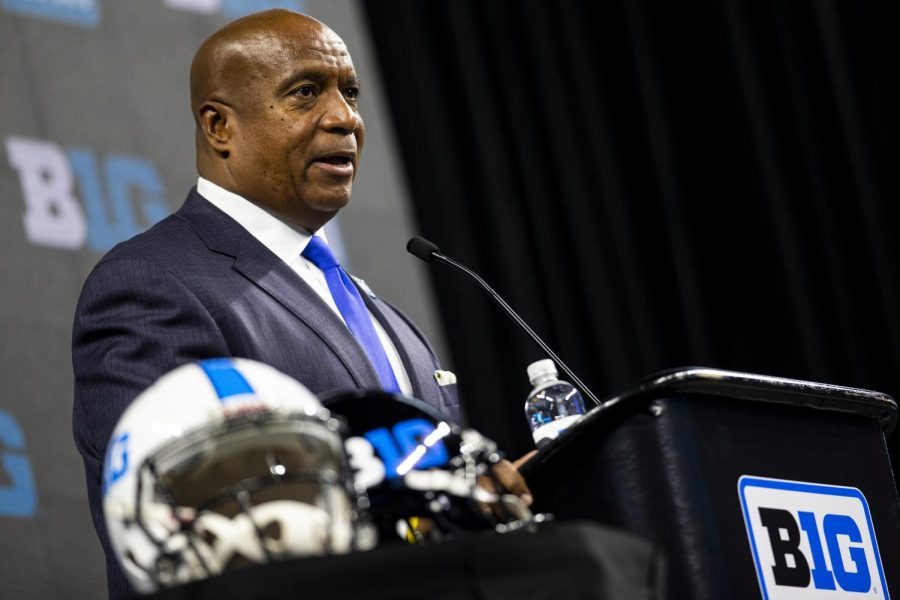Big Ten Commissioner Kevin Warren talks conference realignment, College Football Playoff expansion
The 58-year-old held a press conference to kick off the league’s 50th annual football media days Tuesday morning.
Big Ten commissioner Kevin Warren speaks during day one of Big Ten Media Days at Lucas Oil Stadium in Indianapolis, Ind., on Tuesday, July 26, 2022. The event marked the 50th annual Big Ten Media Days.
July 26, 2022
INDIANAPOLIS — Big Ten Conference Commissioner Kevin Warren made one thing clear during a 43-minute press conference Tuesday morning at Lucas Oil Stadium: he values adaptability.
At his league’s 50th annual football media days, Warren delivered his thoughts on College Football Playoff expansion, conference realignment, and television contracts.
While he offered no specific figures, models, or goals, Warren noted that he and other Big Ten leaders will need to be flexible in the coming years.
“Some of the things we have to keep in mind is we are in a perpetual state of change,” Warren said. “We need to become comfortable in change. We need to embrace change. All these things that we’re dealing with right now, we had those mapped out even a couple years ago.
“Whether it’s name, image, and likeness or transformation, we always want to take a leadership role in doing the right things for the right reasons at the right time for our student-athletes,” Warren added.
The 58-year-old argued that Big Ten athletes will have more academic and athletic opportunities made available to them when USC and UCLA join the conference in 2024.
Adding two now-Pac-12 teams will push the Big Ten across four time zones.
“I always think of the opportunities, not the issues or the problems,” Warren said. “What are the opportunities, now that we’re across four time zones, now that we do have schools, in 2024, from New York, New Jersey to Los Angeles? What are the different cultural elements in each one of those environments?
“We have two years now to plan,” Warren added. “We have built a Big Ten readiness committee that we will activate to start working with USC and UCLA to get ideas as far as what we can do … I look at it as not a negative. I look at it as a positive, from an academic standpoint. What we will do is, we’ll work through these next two years from a scheduling component to make sure we create the environment that’s most healthy and holistic for our student-athletes.”
Warren also noted that the addition of UCLA and USC will expand the business opportunities available to the Big Ten. The conference, and its television network, will be available to consumers in major media markets like New York City, Chicago, and Los Angeles.
Warren said the Big Ten’s expansion across four time zones will allow the league to make its live content available from morning until night. The new wealth of live programming will also increase the number of potential sponsorships available to the conference.
The influx of live content may affect the Big Ten’s new television contracts too. The league’s current media rights agreements expire in 2022.
Before adding USC and UCLA, the Big Ten was reportedly close to striking a media rights deal worth up to $1 billion per year.
Warren did not disclose the dollar amount the Big Ten is looking to get out of its new media contracts. He did not hint at the number of television partners involved in current negotiations either.
“Media rights, we’ve been working on those,” Warren said. “I’m incredibly pleased with where we are. We have great opportunities. We’re finalizing our deals. I look forward to standing before you to make an announcement sometime here, sooner than later.
“So, while the dollars are important to our member institutions,” Warren added, “it’s really about the platform to provide financial stability to our member institutions so we can provide excellent healthcare, mental health services, life skills programs, and even educational experiences to our student-athletes.”
Warren proposed that the Big Ten’s addition of USC and UCLA will also help college football on a national level. The former Grand Canyon University men’s basketball player said the schools could bring new perspectives to College Football Playoff expansion talks.
“I’m 100 percent supportive of College Football Playoff expansion,” Warren said. “I’m excited that we now will have some new members in the room who will have very creative ideas … What is that right number? We’ll figure it out. I’m confident we’ll get College Football Playoff expansion resolved.
“So, as we work through all these, whether it’s automatic qualifier, whatever the case may be, I’m confident, as we get these new individuals in a room, get these issues on the table, that we’ll be able to reach some resolution, and again, make sure we ask ourselves the right questions for the right reasons at the right time for our student-athletes and our fans. I look forward to the day we can expand the College Football Playoff. I’m confident that it will happen.”
Warren also said he thinks an expanded College Football Playoff should have multiple media rights partners. He added that “critical bowl relationships” will need to be protected.
The College Football Playoff will remain a four-team affair until its current media contract expires in 2025. The earliest the College Football Playoff could expand is 2026.



